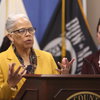Hyman is a prospector, panning for the gold of forgotten history
Donald Hyman brings history to life by portraying people from the past.
Albany hotelier Adam Black Jr.; James Matthews, the state’s first African-American judge; and James Dickson, a New Scotland native and general manager for the Slingerland family, will be reborn on Oct. 5 for those attending the New Scotland Historical Association meeting.
“They come back to me like I’m listening to lyrics in a song,” says Hyman in this week’s podcast as, speaking in rapid-fire fashion, he names many of the people he has come to know through his work of resurrecting them.
Hyman researches the often-forgotten men he portrays both online and through original documents like letters and church records. “I try to find in their own words things they would say,” he says.
He likens it to being a coffee or wine taster — finding the subtle differences, the idiosyncrasies that distinguish one from another.
While he makes James Dickson more humorous, getting along with his community, Judge Matthews, Hyman says, is more disciplined — he knew he had the qualifications and his confidence overrides the insecurity.
Adam Blake started as a busboy and worked his way up to building the Kenmore Hotel on Pearl Street in Albany, where famous visitors like Charles Dickens stayed. For Blake, Hyman said, “It was better to have a hole in the wall of your own than another man’s mansion.”
Hyman concludes of these 19th-Century African Americans, “If the door were open, they would definitely go through it.”
Hyman, who grew up in Brooklyn, has a particular fondness for Harlem and its rich history. He studied fashion design at Parsons, focusing on styles during the Jazz Age of the Roaring Twenties, and on the rock-and-roll era of the 1950s.
Hyman has a map of all the clubs and speakeasies in Harlem in the 1920s.
When Harlem was rediscovered in the 1970s, Hyman said, “It’s like someone had gone to Egypt and discovered the pyramids under the sand.”
He cites James Van Der Zee’s photographs of Harlem in the 1920s and ’30s — elegant black-and-white portraits of African Americans.
There was dignity, elegance, and style, Hyman said, going on to describe pictures of his mother and her sisters at the Savoy Ballroom “dressed to the nines.” “They’d have cocktail sips,” he said.
A world traveler, Hyman embraces all of history. Travel, he says, “keeps you from being brainwashed.”
A teacher, Hyman says he can quiet his students, and inspire their wonder, by telling them how, in New Orleans, people are buried above ground, or how, in Alaska, where he served in the military, there are days with 24 hours of sunlight.
A singer, Hyman says he is just as comfortable doing James Tayor as James Brown.
In New York City, he noted, you can be isolated in an ethnic enclave. “My thing is, I get on the train and just get off,” he says, enjoying whatever new things and people he finds there.
He has written plays for the State Museum and portrayed enslaved people at the Schuyler Mansion.
Hyman says of the Capital Region, “I just stumbled upon it, like a gold mine.”
When he first arrived in Albany, Mary Liz and Paul Stewart, who have restored the home of abolitionists Harriet and Stephen Myers for their Underground Railroad Education Center, walked him around the neighborhood and he felt its richness.
Hyman likens what he does now to prospectors who pan for gold, sifting through the debris to find the nuggets.
Rather than celebrating baseball players or rappers, he likes to portray individuals who prevailed and overcame. In Jamaica, Hyman said, they would say of these individuals, “They overstood.”
“It’s not about me,” he concludes of his work. “It’s about their legacy.”
— Melissa Hale-Spencer



